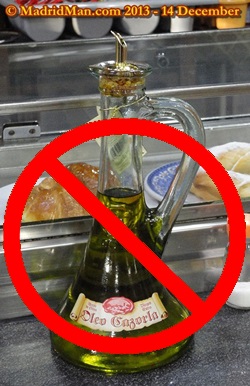
 In many ways Spain is still a very quaint country, retains many old-world charms, and puts higher value on quality of life rather than the quantity of life or the size of your bank account. But this is sadly changing.
In many ways Spain is still a very quaint country, retains many old-world charms, and puts higher value on quality of life rather than the quantity of life or the size of your bank account. But this is sadly changing.
Little by little, Spain is becoming more homogenized with the rest of Europe and the world, and is not-so-slowly losing its identity. Young people no longer listen to flamenco music. American TV series, Hollywood movies, and US-made music dominate the media. Only a small percentage of Spaniards are practicing Catholics.
Some might argue it’s about time that Spain drag itself into the 21st century – or at least into the 20th – and toss-away these “backward” customs and practices and get with the times, effectively stripping it of its identity. Admittedly, many changes are necessary and welcome.
The European Union, with support of the current Spanish government, has approved a measure to regulate OLIVE OIL, Spain’s greatest and most lucrative product, by removing the self-serve pitchers at bars, cafés, and restaurants in favor of a pre-approved, labeled, pre-packaged product – effective 1 January 2014.
They claim many establishments may not be cleaning the “aceiteras” – “olive oil pitchers” – thoroughly or at all, potentially mixing original the flavor from one brand to another. They also say olive oil in glass dispensers degrades when exposed to light and oxygen.
 Spain’s most popular breakfast is toasted bread with olive oil, salt, and sometimes garlic and tomato purée. Upon placing their orders, customers are sometimes served breakfast already prepared on a plate. But more often than not, the client is offered a plate with one or two halves of toasted, dry bread along with an “aceitera” – “olive oil pitcher/dispenser”, a salt shaker, and tomato purée in a small bowl for the customer to create his own breakfast masterpiece.
Spain’s most popular breakfast is toasted bread with olive oil, salt, and sometimes garlic and tomato purée. Upon placing their orders, customers are sometimes served breakfast already prepared on a plate. But more often than not, the client is offered a plate with one or two halves of toasted, dry bread along with an “aceitera” – “olive oil pitcher/dispenser”, a salt shaker, and tomato purée in a small bowl for the customer to create his own breakfast masterpiece.
Having to essentially make your own breakfast in a café is kind of counterintuitive to my American mind. But once you experience it a few times, where you have the freedom to put very little virgin olive oil – or a lot (as I do) , a little salt or a lot, a little tomato puree or a lot, makes you feel right at home. THIS is one of Spain’s charms, one which will be erased since the widespread production of olive oil several hundred years ago. Olive oil is, afterall, an essential ingredient in the Mediterranean diet.
So why regulate olive oil? They say it’s to assure the customer, many of whom may visit from abroad, experience an assured, high-quality product and then choose to buy the Spain-made, imported product back home.
 Starting in January 2014, cafés, bars, and restaurants will do away with serve-yourself olive oil pitchers and customers will be given single-serving, plastic, tear-top packets of olive oil with the commercial producers name clearly printed on it – just like the ketchup packets they give you at fastfood restaurants. Establishments will have a “transition period” of 2 months, allowing them to go through their remaining stock olive oil without penalty. But after that period of time, they’ll be fined.
Starting in January 2014, cafés, bars, and restaurants will do away with serve-yourself olive oil pitchers and customers will be given single-serving, plastic, tear-top packets of olive oil with the commercial producers name clearly printed on it – just like the ketchup packets they give you at fastfood restaurants. Establishments will have a “transition period” of 2 months, allowing them to go through their remaining stock olive oil without penalty. But after that period of time, they’ll be fined.
Have you ever grabbed one of those olive oil pitchers only to find the oil had dripped down the neck, getting your hands all oily – and then desperately trying to dry/clean them with those non-absorbent, waxy bar napkins? That’s nasty, I’ll admit. But nastier is tearing open an olive oil packet – if you can get it open in the first place – and sending the (sometimes) pressurized contents all over your shirt. Or worse, all over the person across the table! And you’ll STILL, surely, get olive oil on your hands!
The establishments are against the measure, saying the individually packaged product will cost more, forcing them to raise the price of their “pan tostado con aceite“. This can make their strained finances even worse in this already struggling economy.
Ecologists are against the measure, too. They say less than 30% of these plastic packets will make it to recycling stations, the rest going to the landfills or to city streets or sewers and creating additional, unnecessary environmental strain.
So who benefits? One would assume the end-user, the customer, would benefit the most by receiving an approved, high-quality Spain-grown product. The few producers of olive oil, those on the government’s approved list, will benefit too, of course. No more getting supermarket, store-brand olive oils, oftentimes from a blend of different olives oils, which may come more cheaply from Turkey, Morocco or “other“. No more getting home-grown olive oil from the bar-owner’s “pueblo“, made at the village “cooperativa” for cheap, even if it would happen to be a very high-quality product.
So who loses? The customer also loses in this one. They’ll not only pay more, but they’ll also lose the freedom of self-serve. The customer also misses out on one of Spain’s homestyle customs at the café breakfast table. The environment clearly loses, too, as more waste will go to landfills. Also, at least some of the product will be wasted as it is impossible to extract the entire contents of the product from the packets, thereby the establishment will pay for product not consumed.
Before long, freshly-layed eggs or legs of cured hams will no longer be allowed to kept at room-temperature for days, either, and beautiful scenes like the photo below will become a thing of the past. (I can hear a lot of people out there saying, “It’s about time! That’s not sanitary!“)
For those lovers of this familiar, self-serve custom in Spain, get it while you can!!
Article: (in Spanish) http://sociedad.elpais.com/sociedad/2013/11/15/actualidad/1384549071_954125.html
Video:
Video:
Share THIS on Facebook!






It seems one of the principle reasons to incorporate the change is to bolster exportation levels by ensuring the 57 million annual visitors to Spain see the oil with authentic labeling and can correctly guage its quality. I don’t agree.
I don’t agree either, Glenn. While it *may* be a benefit for exportation purposes – and those 57, it’s a punishment to the 47 million people living here on a daily basis. But hey, that’s a difference of 10 million people! Someone clearly did the math and is taking better care of the bottom line. Hmph! I would argue that visualizing the golden olive oil in glass serving flasks promotes Spanish olive oil more than seeing a name on a outside of the plastic packet.
This is sad news for anybody who loves – like myself – Spanish life style
(or at least a big part of it). Given that there has been a lot of fraud around
Spanish olive oil production and distribution, I cannot believe, that EU
regulations will make anything better. All they are going to achieve is
to deprive us ( and the Spanish people of course) of just another
simple pleasure of life which, if you knew the right place, is/was – for what it’s worth – hard to top.
I’m with you 100%, Gert. I understand the marketing “reasons”, but don’t like the result of penalizing the people who live in Spain. Let bar owners use South American olive oil if they want to (although that’d be silly), but keep it free-flowing. There’s no need to mandate bar owners how to serve their products. If the customers don’t like it, they can go elsewhere.
Very silly. There are similar rules in the States, but it is surprising in Spain. I do suspect that very quickly this regulation will be worked around in various ways and outright ignored in many places.
I’m with you on that one, Matthew. MY HOPE is that the staff will just pour the olive oil on for you in the back and then serve it, but then you may not get as much as you’d like – or get too much. (is that even possible???) I’m also hoping that, maybe, in the villages or smaller places they may have a kind of “self-serve” table somewhere between the kitchen and the dining area where it wouldn’t be so public and yet accessible to the patrons. We’ll see.
I was never aware there were even olive oil dispensers in existence, it looks very useful! It’s unfortunate that they were removed form service in Spain. Are there any other areas in the world that still use olive oil dispensers?
Regards,
Christopher Karam